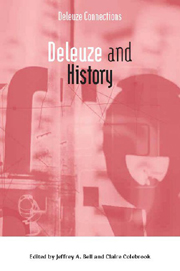Book contents
- Frontmatter
- Contents
- Introduction
- 1 Events, Becoming and History
- 2 Of the Rise and Progress of Philosophical Concepts: Deleuze's Humean Historiography
- 3 Theory of Delay in Balibar, Freud and Deleuze: Décalage, Nachträglichkeit, Retard
- 4 Geohistory and Hydro-Bio-Politics
- 5 The Thought of History in Benjamin and Deleuze
- 6 The Cannibal Within: White Men and the Embodiment of Evolutionary Time
- 7 Ageing, Perpetual Perishing and the Event as Pure Novelty: Péguy, Whitehead and Deleuze on Time and History
- 8 Cinema, Chronos/Cronos: Becoming an Accomplice to the Impasse of History
- 9 Deleuze's Untimely: Uses and Abuses in the Appropriation of Nietzsche
- 10 Is Anti-Oedipus a May '68 book?
- 11 Molar Entities and Molecular Populations in Human History
- Notes on Contributors
- Index
8 - Cinema, Chronos/Cronos: Becoming an Accomplice to the Impasse of History
Published online by Cambridge University Press: 12 September 2012
- Frontmatter
- Contents
- Introduction
- 1 Events, Becoming and History
- 2 Of the Rise and Progress of Philosophical Concepts: Deleuze's Humean Historiography
- 3 Theory of Delay in Balibar, Freud and Deleuze: Décalage, Nachträglichkeit, Retard
- 4 Geohistory and Hydro-Bio-Politics
- 5 The Thought of History in Benjamin and Deleuze
- 6 The Cannibal Within: White Men and the Embodiment of Evolutionary Time
- 7 Ageing, Perpetual Perishing and the Event as Pure Novelty: Péguy, Whitehead and Deleuze on Time and History
- 8 Cinema, Chronos/Cronos: Becoming an Accomplice to the Impasse of History
- 9 Deleuze's Untimely: Uses and Abuses in the Appropriation of Nietzsche
- 10 Is Anti-Oedipus a May '68 book?
- 11 Molar Entities and Molecular Populations in Human History
- Notes on Contributors
- Index
Summary
‘This book does not set out to produce a history of the cinema’ writes Deleuze in the Preface to the English edition of Cinema 1 (Deleuze 2002: ix). Yet despite such a declaration, a (necessarily incomplete but cogent) history of cinema does arise from the pages of the cinema books, even if only as a by-product of his real project, the ‘practice of … concepts that cinema gives rise to’ (Deleuze 2001: 280). Similarly, the cinema books do not seemingly set out to explore the relationship between film and history in general. Yet, once again, this is exactly (inevitably) what happens. Further, Deleuze makes explicit claims about this relationship. While commentators of the cinema books have acknowledged the part the history of cinema plays in his work (Kovács, 2000), the nexus of film and history in general has yet to recognised. This is the endeavour of this essay.
In 1983 and 1985 Gilles Deleuze published two related volumes: Cinéma 1, L'Image-mouvement and Cinéma 2, L'Image-temps (hereafter C1 and C2; they appeared in translation in English in 1986 and 1989 respectively). In these books Deleuze's fundamental move is to assemble the philosophy of Henri Bergson's Matter and Memory with cinema. Bergson's text, published in 1896 (the same year as the first cinema exhibition), acknowledges the world of matter and the world of spirit as different in kind, neither one being reducible to the other, yet they interact, they are inseparable.
- Type
- Chapter
- Information
- Deleuze and History , pp. 161 - 187Publisher: Edinburgh University PressPrint publication year: 2009



